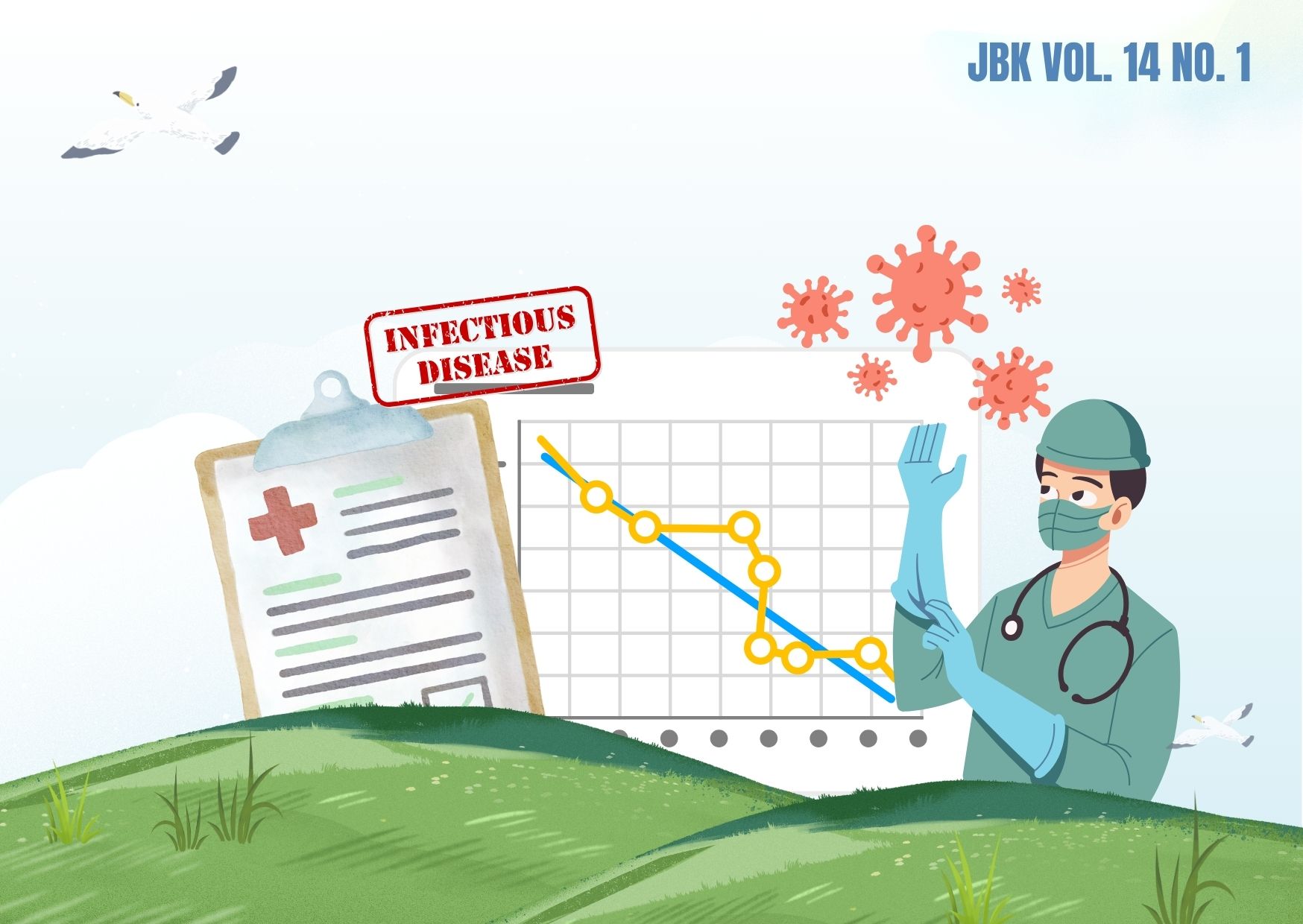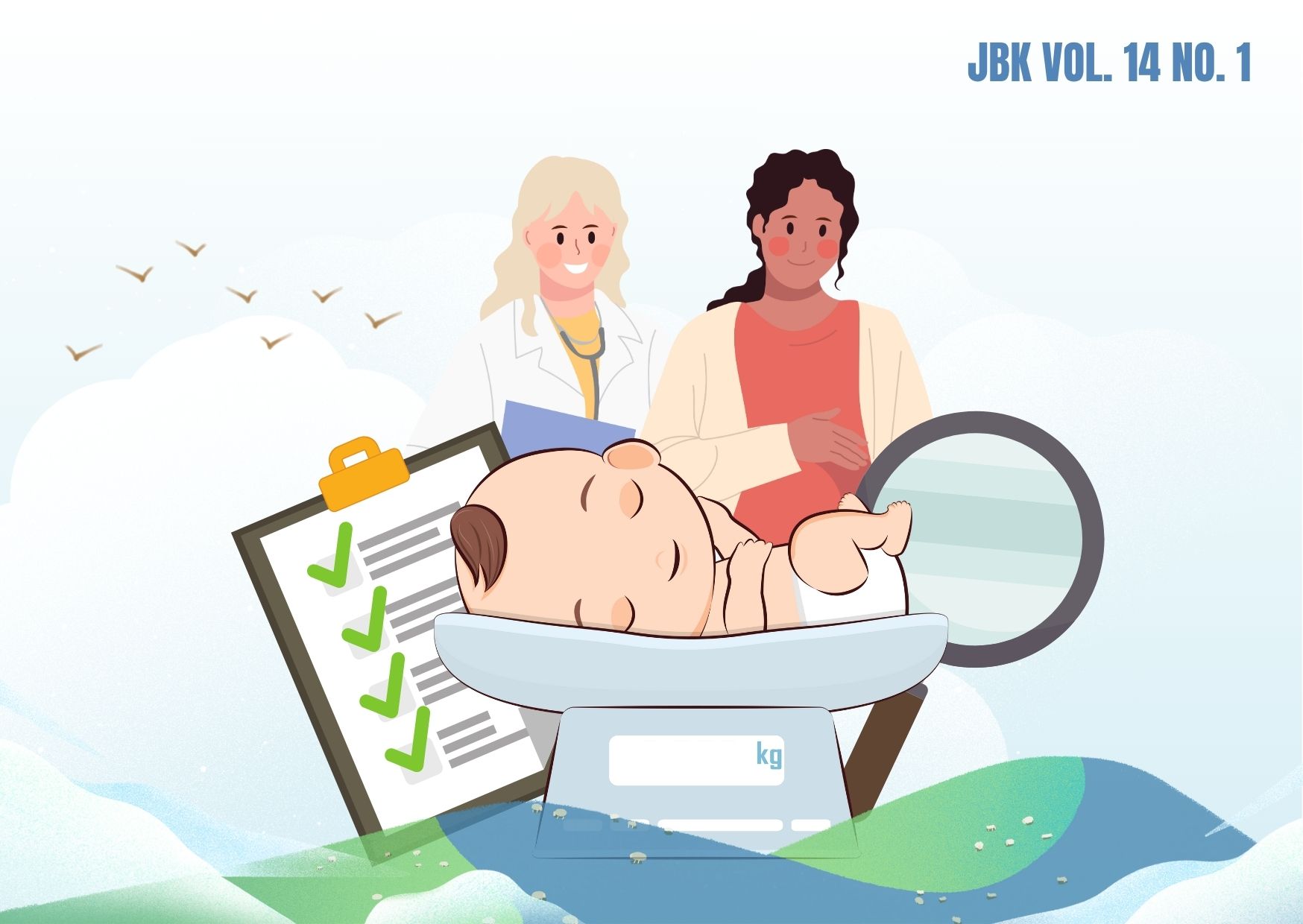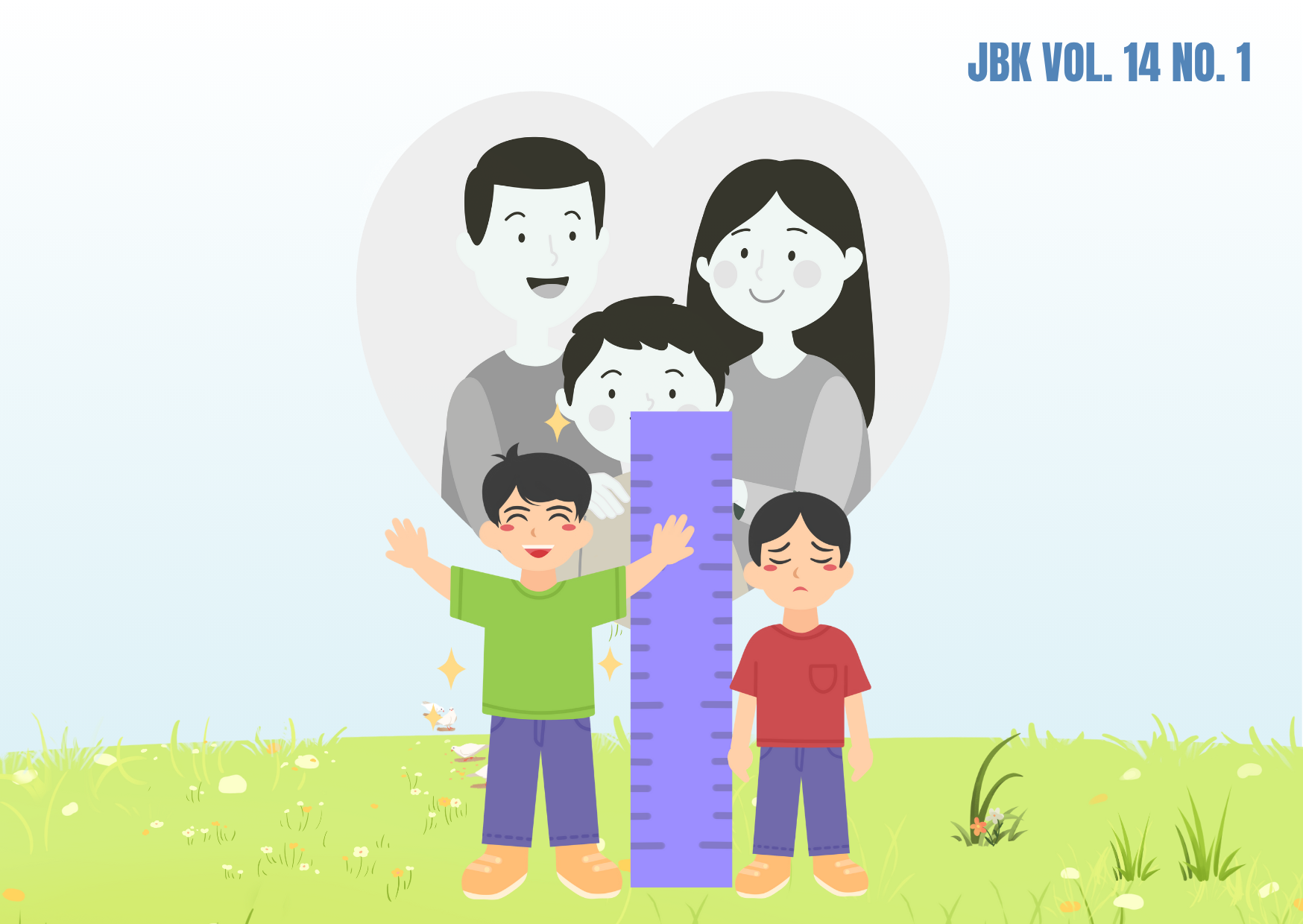ANALYSIS OF EMPLOYMENT STATUS OF COUPLE OF REPRODUCTIVE AGE ON THE INTENTIONS TO USE CONTRACEPTION IN UNMET NEED CONDITIONS
Based on the results of the 2021 Family Data Collection, it was revealed that Ngadiluwih District, Kediri Regency, East Java Province has a high unmet need case of 19.25%. This unmet need case is far below the target set by the RPJMN for 2019-2024. The village with the highest unmet need rate in Ngadiluwih District is Mangunrejo Village with a case of 16.89%. Various factors contribute to the unmet need rate, including socioeconomic conditions. The purpose of this study was to analyze the occupational status of the intention to use contraception in couples of childbearing age with unmet needs in Mangunrejo Village. The research was conducted with a cross-sectional approach through analytic observational methods in Mangunrejo Village in April-June 2022. The method used was interviewing and distributing questionnaires to respondents. The sample used couples of childbearing age who fit the inclusion criteria in Mangunrejo Village. As for the total of 12 respondents working and 12 respondents not working, as many as 61.3% of respondents not working have the intention to use contraception and as many as 47.8% of working respondents have the intention to use contraception. The results of the analysis showed that there was no significant relationship between the employment status of unmet need women with intention to use contraception (p=0.325). So it can be concluded that reproductive couples in Ngadiluwih District who are in unmet need condition, do not intend to use contraception who are all of those who are workers
Sinai I, Omoluabi E, Jimoh A, Jurczynska K. Unmet Need for Family Planning and Barriers to Contraceptive Use in Kaduna, Nigeria: Culture, Myths and Perceptions. Cult Heal Sex [Internet]. 2020 Nov 1;22(11):1253–68. Available from: doi: 10.1080/13691058.2019.1672894
BKKBN. Dictionary of Population and Family Planning Terms. In: Population and Family Planning Agency [Internet]. Available from: https://keluargaberisikostunting-dashboard.bkkbn.go.id/_Nasional/Bantuan/Kamus_Istilah_Kependudukan_Dan_Keluarga_Berencana_Sub_Menu_List.Pdf
Worku SA, Ahmed SM, Mulushewa TF. Unmet Need for Family Planning and its Associated Factors among Women of Reproductive Age in Debre Berhan Town, Amhara, Ethiopia. BMC Res Notes [Internet]. 2019 Mar 15;12(1). Available from: doi: 10.1186/s13104-019-4180-9 https://www.ncbi.nlm.nih.gov/pmc/articles/PMC6419818/
Setyorini RH. Descriptive Analysis of Unmet Need Women. Adv Heal Sci Res [Internet]. 2021;34:20–3. Available from: http://creativecommons.org/Licenses/By-Nc/4.0/
Speizer IS, Calhoun LM. Her, His, and Their Fertility Desires and Contraceptive Behaviors: A Focus on Young Couples in Six Countries. Glob Public Health [Internet]. 2022;17(7):1282–98. Available from: doi: 10.1080/17441692.2021.1922732 https://pubmed.ncbi.nlm.nih.gov/33939936/
Demography S, Health D. Indonesia [Internet]. 2017. Available from: http://www.dhsprogram.com.
Presidential Regulation Number 2 of 2015. Attachment to Presidential Regulation of the Republic of Indonesia Number 2 of 2015 Concerning the National Medium-Term Development Plan 2015-2019 [Internet]. 2015. Available from: https://www.djkn.kemenkeu.go.id/Pug/Assets/Files/Informasi/Perpres-Nomor-2-Tahun-2015.Pdf
Presidential Regulation Number 18 of 2020. Attachment to Presidential Regulation of the Republic of Indonesia Number 18 of 2020 Concerning the National Medium-Term Development Plan 2020-2024 Narasi Republik Indonesia [Internet]. 2020. Available from:https://jdih.setkab.go.id/Puudoc/176020/Perpres_Nomor_18_ Tahun_2020.PDF
Dixit A, Johns NE, Ghule M, Battala M, Begum S, Yore J, et al. Male–Female Concordance in Reported Involvement of Women in Contraceptive Decision-Making and its Association with Modern Contraceptive Use among Couples in Rural Maharashtra, India. Reprod Health [Internet]. 2021 Dec 1;18(1). Available from: doi: 10.1186/s12978-021-01187-8 https://pubmed.ncbi.nlm.nih.gov/34193214/
Nkoka O, Mphande WM, Ntenda PAM, Milanzi EB, Kanje V, Guo SJG. Multilevel Analysis of Factors Associated with Unmet Need for Family Planning among Malawian Women. BMC Public Health [Internet]. 2020 May 15;20(1):705. Available from: doi: 10.1186/s12889-020-08885-1 https://pubmed.ncbi.nlm.nih.gov/32414359/
Putri SE, Widati S. The Role of Family Social Support in Decision Making Using Long-Term Contraceptive Methods. Indonesia J Heal Promote Heal Educ [Internet]. 2020;8(2):163–71. Available from: doi: 10.20473/Jpk.V8.I2.2020.163-171 https://e-journal.unair.ac.id/PROMKES/Article/View/16297
Nur R, Subardin AB, Panggabean P, Sirait E, Wartana IK, Kolupe VM, et al. Factors Related to the Incidence of Unmet Need in Couples of Reproductive Age in the Working Area of Marawola Health Center. Gac Sanit [Internet]. 2021 Jan 1;35:S176–9. Available from: doi: 10.1016/j.gaceta.2021.10.019 https://pubmed.ncbi.nlm.nih.gov/34929805/
Mertasari L, Komang Sulyastini N,Sugandini W, Ganesha U. Education Identification of Causes of Unmet Need for Family Planning in Pegayaman Village, Sukasada District, Buleleng Regency in 2019. Bunda Edu-Mindwifery J [Internet]. 2021 Feb 28;4(1):60–6. Available from: issn: 26227487 https://bemj.e-journal.id/BEMJ/Article/View/45
Adebowale SA, Palamuleni ME. Determinants of Unmet Need for Modern Contraception and Reasons for Non-use among Married Women in Rural Areas of Burkina Faso. African Popular Stud [Internet]. 2014 Apr 29;28(1):499–514. Available from: doi: https://doi.org/10.11564/28-1-503. http://aps.journals.ac.za/
Install ES. The Influence of Husband's Support on the Incidence of Unmet Need in Fertile Couples in the Bangkelekila Health Center Work Area, North Toraja Regency [Internet]. [Makassar]: Hasanudin University Makassar; 2020. Available from: http://repository.unhas.ac.id/2466/2/K012181088_Tesis_10-09-2020 1-2.Pdf
Wuni C, Turpin CA, Dassah ET. Determinants of Contraceptive Use and Future Contraceptive Intentions of Women Attending Child Welfare Clinics in Urban Ghana. BMC Public Health [Internet]. 2017 Aug 1;18(1):79. Available from: doi: 10.1186/s12889-017-4641-9
Ajzen I. Attitudes, Personality and Behavior [Internet]. 2nd ed. England: Open University Press; 2005. Available from: https://psicoexperimental.files.wordpress.com/2011/03/ajzeni-2005-attitudes-personality-and-behaviour-2nd-ed-open-university-press.pdf
Nurhalimah S. Factors Related to the IncidentUnmet Need KB in Tugu District, Semarang City [Internet]. [Semarang]: Semarang State University; 2019. Available from: http://lib.unnes.ac.id/36460/1/6411415123_Optimized.Pdf
Lutfiyati A, Susanti D, Studi P, Faculty K, University K, Achmad J, et al. The Wife's Characteristics Associated with Unmet Need for Family Planning in Couples of Reproductive Age in Wonokromo, Pleret, Bantul District. J Health Civil Med [Internet]. 2022;13(01):23–30. Available from: https://www.jurnalmadanimedika.ac.id/index.php/JMM/article/download/210/153
Tripertiwi S. The Relationship between Mother's Employment Status and Mother's Interest in Using IUD Contraception at Bengkuring Samarinda Health Center in 2019 [Internet]. [Samarinda]: Health Polytechnic of the Ministry of Health of East Kalimantan; 2019. Available from: http://repository.poltekkes-kaltim.ac.id/222/
Marito BS. Factors Related to the Incidence of Unmet Need of Fertile Age Couples (PUS) in Pasir Matogu Village, Angkola Muaratais District, South Tapanuli Regency [Internet]. [Padangsidimpuan]: Faculty of Health, Aufa Royhan University, Padangsidimpuan City; 2021. Available from: https://repository.unar.ac.id/jspui/handle/123456789/2929
Irwan. Health Ethics and Behavior [Internet]. Yogyakarta: CV. Absolut Media; 2017. Available from: https://repository.ung.ac.id/karyailmiah/show/1784/irwan-buku-etika-dan-perilaku-kesehatan.html
Pakpahan M, Siregar D, SusilawatyA, Mustar T, Sianturi EIME, Sitanggang MRGTYF, et al. Health Promotion and Behavior. 1st ed. Watrianthos R, editor. Medan:. Our Writing Foundation; 2021.
Rachmawati WC. Health Promotion and Behavioral Science [Internet]. Malang: Wineka Media Publisher; 2019. Available from: https://fik.um.ac.id/wp-content/uploads/2020/10/2.-PROMOSI-KESEHATAN-DAN-ILMU-PERILAKU.pdf
Copyright (c) 2024 Jurnal Biometrika dan Kependudukan (Journal of Biometrics and Population)

This work is licensed under a Creative Commons Attribution-NonCommercial-ShareAlike 4.0 International License.
Copyright ©2022 Jurnal Biometrika dan Kependudukan (Journal of Biometrics and Population)
This work is licensed under a Creative Commons Attribution-NonCommercial-ShareAlike 4.0 International License.
1. Copyright of all journal manuscripts is held by the Jurnal Biometrika dan Kependudukan.
2. Formal legal provisions to access digital articles of the electronic journals are subject to the provision of the Creative Commons Attribution-ShareAlike license (CC BY-NC-SA), which means that Jurnal Kesehatan Biometrika dan Kependudukan to keep, transfer media/format, manage in the form of databases, maintain, and publish articles.
3. Published manuscripts both printed and electronic are open access for educational, research, and library purposes. Additionally, the editorial board is not responsible for any violations of copyright law.



































